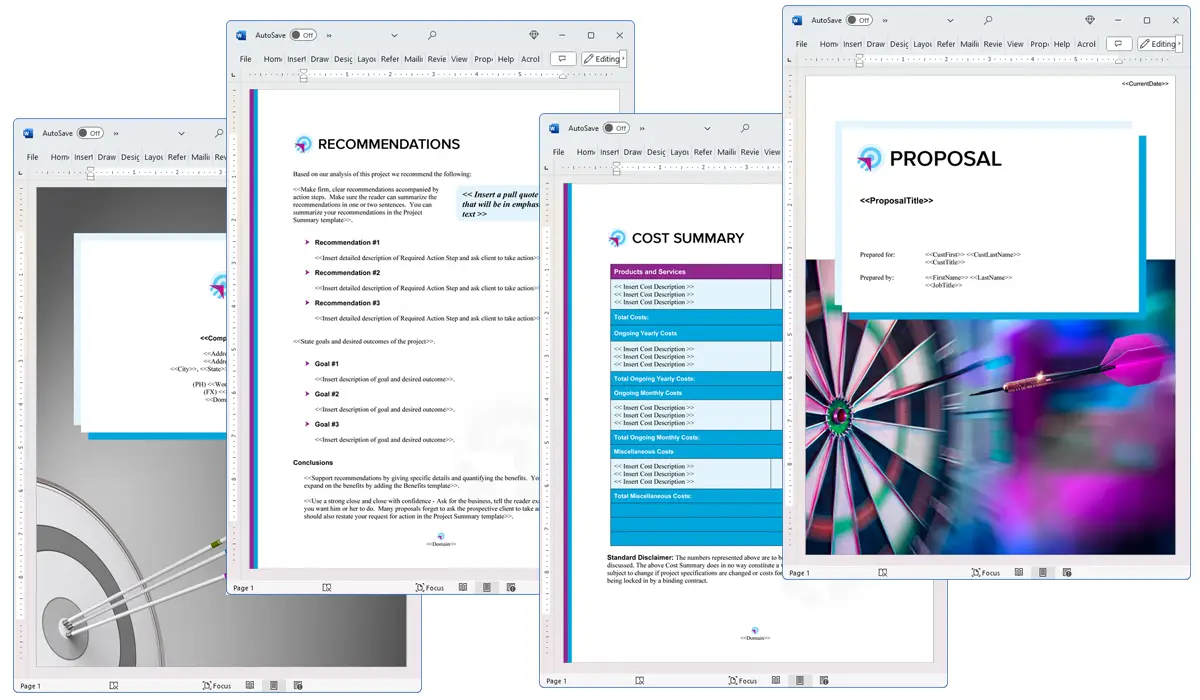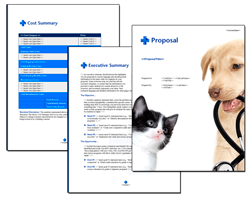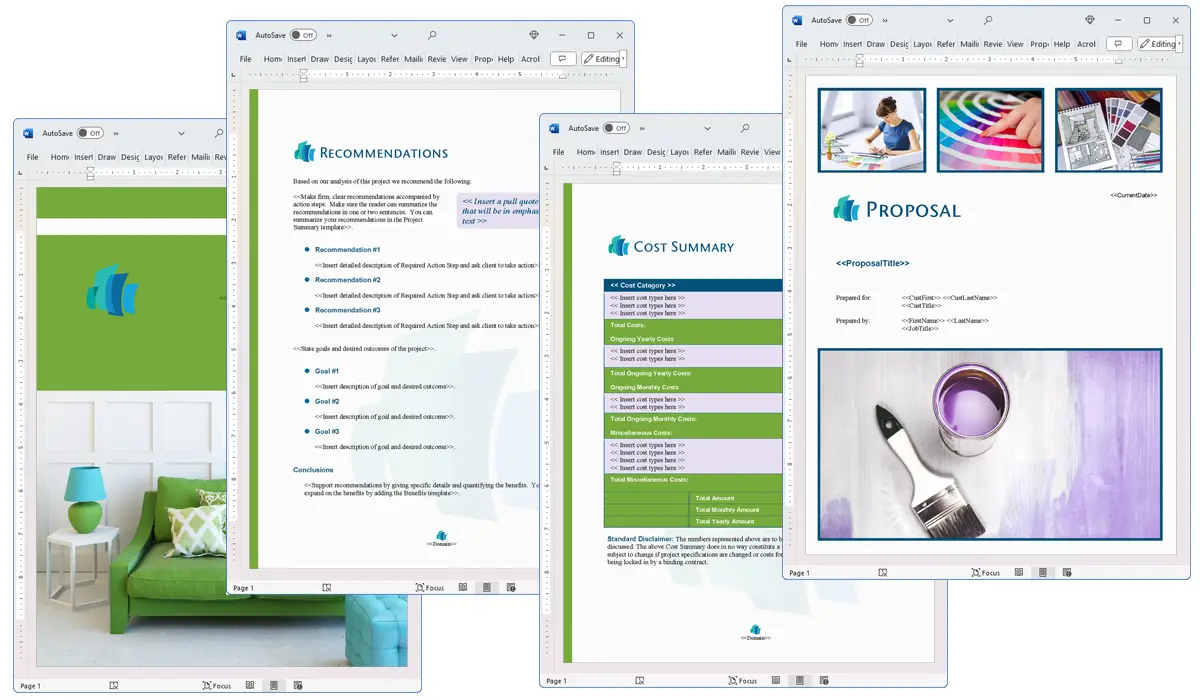What is the Discrimination chapter used for?
Proposal Kit Professional Bundle adds more design themes, all six Contract Packs,
a project management library, and Expert Edition software.

Illustration of Proposal Pack Bullseye #3
We include this Discrimination chapter template in every Proposal Pack, along with thousands more. You assemble this chapter with others in various combinations to create custom-tailored business proposals, plans, reports, and other documents. Proposal Packs apply custom visual designs to the templates, giving the final documents a consistent professional finish.
 DOWNLOADABLE, ONE-TIME COST, NO SUBSCRIPTION FEES
DOWNLOADABLE, ONE-TIME COST, NO SUBSCRIPTION FEES
Overview of the Discrimination Chapter
In the field of business proposals, the Discrimination chapter serves an important role in outlining and addressing issues related to discrimination. This chapter is important for organizations aiming to establish a clear stance against discriminatory practices within their workplace or in their services. Whether included as part of an employee handbook or used to highlight company policies in a business proposal, the Discrimination chapter helps ensure that the standards for fairness and equality are explicitly communicated and understood.
How is the Discrimination Chapter Used?
The Discrimination chapter is primarily used in business proposals to either discuss the issue of discrimination within a specific context or to affirm a company's commitment to a non-discriminatory policy. When constructing a proposal, this chapter can be customized to address specific types of discrimination that might be relevant to the business or the project at hand, such as racial, gender, age, or disability discrimination. It serves as a foundational element that reinforces the ethical standards and legal compliances of an organization.
What is Included in the Discrimination Chapter?
Typically, the Discrimination chapter includes several key elements:
- Definition of Discrimination: Clear explanations of what constitutes discrimination withconsidering the situation of the proposal.
- Company Policies: Detailed description of the organization's policies regarding discrimination, including preventative measures and disciplinary actions for policy violations.
- Legal Framework: Overview of relevant legal standards and compliance requirements that the company adheres to, which could be local, state, or federal laws.
- Examples and Scenarios: Hypothetical or past examples of discrimination issues and how they were handled, providing practical insights into the company's policy in action.
- Commitment Statement: A reaffirmation of the organization's commitment to maintaining a workplace and operational practices free from discrimination.
Use Case Examples for the Discrimination Chapter
- Employment Proposals: To outline the non-discrimination hiring practices and workplace diversity policies.
- Human Resources: In proposals aiming to update or establish HR policies that enforce equality and prevent workplace discrimination.
- Social Community Initiatives: Proposals for community projects that require a clear stance on non-discriminatory practices towards community members.
- Faith-Based Organizations: Ensuring that all activities and employment practices reflect fairness and equality, irrespective of the religious context.
- Addressing Problems: For organizations needing to address and rectify previous issues of discrimination, detailing the steps and policies put in place to prevent future occurrences.
- Highlighting Negatives: When a proposal needs to discuss potential or existing negative impacts of discrimination within an organization or community and outline corrective measures.
Key Takeaways
- The Discrimination chapter is important for conveying an organization's stance against discrimination in business proposals.
- It is and can be tailored to specific types of discrimination relevant to the business or project.
- This chapter typically includes definitions, company policies, legal frameworks, practical examples, and a commitment statement.
- Its use is applicable in various contexts such as employment, human resources, community initiatives, and faith-based proposals.
- Proper use of the Discrimination chapter ensures that the proposal reflects the organization's commitment to ethical practices and legal compliance.

Illustration of Proposal Pack Animals #5
 What Our Clients Say
What Our Clients SayThe proposal pack is simple to use and a true time saver. At the end of the day, time is money! Great product!"
Operations and Events Manager
Soiree Planners
Vancouver, Canada
 4.7 stars, based on 845 reviews
4.7 stars, based on 845 reviewsRelated Chapters
Samples Using the Discrimination Chapter
Document Layouts Using the Discrimination Chapter

The Discrimination chapter and other chapters are integrated into a Word document as illustrated here in the Proposal Pack Decorator #3 design theme. There are hundreds of design themes available, and every design theme includes the Discrimination chapter template.
A proper business proposal will include multiple chapters. This chapter is just one of many you can build into your proposal. We include the complete fill-in-the-blank template in our Proposal Pack template collections. We also include a library of sample proposals illustrating how companies in different industries, both large and small, have written proposals using our Proposal Packs. This template will show you how to write the Discrimination.
We include a chapter library for you to build from based on your needs. All proposals are different and have different needs and goals. Pick the chapters from our collection and organize them as needed for your proposal.
Using the Proposal Pack template library, you can create any business proposal, report, study, plan, or document.
 Ian Lauder has been helping businesses write their proposals and contracts for two decades. Ian is the owner and founder of Proposal Kit, one of the original sources of business proposal and contract software products started in 1997.
Ian Lauder has been helping businesses write their proposals and contracts for two decades. Ian is the owner and founder of Proposal Kit, one of the original sources of business proposal and contract software products started in 1997.By Ian Lauder
 Published by Proposal Kit, Inc.
Published by Proposal Kit, Inc.


 Cart
Cart
 Facebook
Facebook YouTube
YouTube X
X Search Site
Search Site